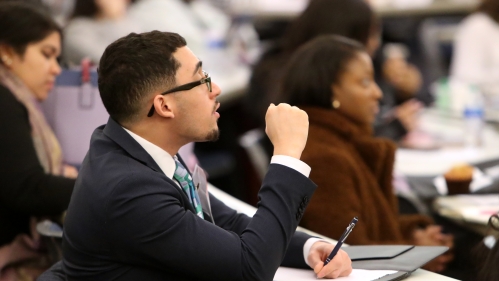
Criminal Defense & Advocacy Clinic
The Rutgers Criminal Defense & Advocacy Clinic (CDAC) provides high-quality, zealous advocacy to clients ensnared in the criminal legal system, primarily representing clients charged with crimes in Camden County municipal courts. As an in-house legal clinic, CDAC’s cases are handled by third-year law students who practice under the careful supervision of CDAC’s director.
Get Legal Help
The Rutgers Criminal Defense & Advocacy Clinic (CDAC) provides free, high-quality, zealous advocacy to clients ensnared in the criminal legal system. The primary focus of CDAC’s work is defending clients charged with crimes in Camden County municipal courts. As an in-house legal clinic, CDAC’s cases are handled by third-year law students who practice under the careful supervision of CDAC’s director and longtime defense attorney, Professor Jessica Frisina. At this time, CDAC is accepting referrals directly from the Public Defender’s office in Camden City (i.e. the Law Offices of Frankie Fontanez). It is not accepting outside referrals or walk-ins. If you are an existing CDAC client or a prospective client who has been referred by the Law Offices of Frankie Fontanez, please contact us at (856) 225-6568 or crim.clinic@rlawclinic.rutgers.edu.
Meet the Director

Jessica Frisina is an Assistant Professor of Law and Director of the Criminal Defense & Advocacy Clinic. Professor Frisina brings a decade of experience in criminal defense to her role as the Clinic’s director. Prior to joining the Rutgers faculty, Professor Frisina served as an Assistant Deputy Public Defender at the New Jersey Office of the Public Defender (NJOPD) for eight years. At NJOPD, she handled a full felony case load, gaining expertise in pretrial litigation and trial practice. Before joining NJOPD, Professor Frisina completed a two-year Equal Justice Works fellowship at the Michigan Children’s Law Center (MCLC) in Detroit. There, she served as a youth defender and launched an Education Advocacy Unit to disrupt the school-prison nexus ensnaring MCLC's clients. Professor Frisina is a graduate of Harvard Law School and Harvard College, where she studied civil rights and American social movements. Drawing on her years of experience in indigent defense, her research and writing center on police-citizen encounters, theories of punishment, and the ethics of criminal practice.
CDAC Course Description
The heart of CDAC students’ case work centers around defending clients charged with crimes in municipal court. Working in teams of two, CDAC’s student attorneys are responsible for every stage of litigation in their cases, including:
- Client interviewing, counseling, and advocacy
- Factual and legal investigation
- Motion practice
- Plea negotiations
- Trial preparation and performance
The students’ case work is complemented by a bi-weekly seminar in which the students learn lawyering, trial advocacy, professional responsibility, and professionalism skills through traditional seminar discussions, role playing, and simulation exercises. In addition, the seminar critically examines the history of the criminal legal system, helps students situate their case work within that history, and invites students to think creatively about opportunities for reform. Finally, the seminar includes the regular use of “case rounds,” a pedagogical tool designed to teach students how to identify problems they are experiencing in their cases, engage in group problem solving, and find common threads within their work.
Credits: 6 academic credits (which also fulfill skills credit requirement)
Eligibility: 3Ls or students who have otherwise completed two-thirds of the credits required to graduate
Pre-Requisites: Students must have successfully completed the following courses prior to enrollment in CDAC:
- Professional Responsibility
- Evidence
- Criminal Procedure* (only one semester required, either Investigations or Adjudications)
* If a student has not completed the Criminal Procedure requirement prior to enrollment but has interned at a criminal defense office, interned at a prosecutor’s office, or has lived personal experience with the criminal system, they should contact Professor Frisina to discuss whether that particular pre-req may be waived.
Other: Students are strongly encouraged to complete Trial Advocacy prior to enrolling in the clinic. Concurrent enrollment in Trial Advocacy, externships, or internships is not permitted.
Explore More